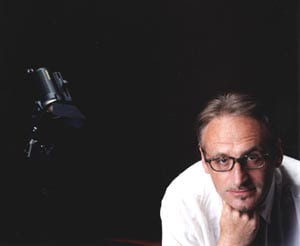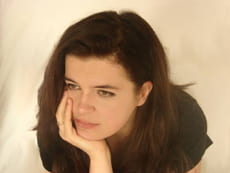 On November 3 during a concert held in conjunction with the 10th edition of the International Composers’ Forum, Sepia Ensemble performed the world premieres of Agnieszka Zdrojek-Suchodolska’s Refleksje for cello solo (2016) and Katarzyna Taborowska’s Arpeggio for 4G violin and clarinet (2016). The concert was held in the New Hall of the Paderewski Academy of Music in Poznań. Members of the Sepia Ensemble who performed on this concert were Paulina Graś-Łukaszewska – flute, Szymon Józwiak – clarinet, Wojciech Jeliński – trombone, Aleksandra Dzwonkowska – pecussion, Tomasz Sośniak – piano, Olga Winkowska – violin, Anna Szmatoła – cello, and Rafał Zapała – electronics, and they were joined by composer Lidia Zielińska, also performing electronics. Other works by Polish composers on this program were Barbara Kaszuba –Innuendoes for piano solo (2014/2015); Artur Kroschel – Tauen for piano and flute (2012); Monika Kędziora – micro-nano-mos seven miniatures for piano solo (2015); Rafał Zapała – Kwadraty na trójkąty for percussion solo (2015); Zbigniew Kozub – Arthrea III for trombone and piano (2015); Ewa Fabiańska-Jelińska – Medytacja I for clarinet, trombone, piano and cello (2016); and Lidia Zielińska – Rdza for flute, clarinet, violin, cello, piano and CD (2010).
On November 3 during a concert held in conjunction with the 10th edition of the International Composers’ Forum, Sepia Ensemble performed the world premieres of Agnieszka Zdrojek-Suchodolska’s Refleksje for cello solo (2016) and Katarzyna Taborowska’s Arpeggio for 4G violin and clarinet (2016). The concert was held in the New Hall of the Paderewski Academy of Music in Poznań. Members of the Sepia Ensemble who performed on this concert were Paulina Graś-Łukaszewska – flute, Szymon Józwiak – clarinet, Wojciech Jeliński – trombone, Aleksandra Dzwonkowska – pecussion, Tomasz Sośniak – piano, Olga Winkowska – violin, Anna Szmatoła – cello, and Rafał Zapała – electronics, and they were joined by composer Lidia Zielińska, also performing electronics. Other works by Polish composers on this program were Barbara Kaszuba –Innuendoes for piano solo (2014/2015); Artur Kroschel – Tauen for piano and flute (2012); Monika Kędziora – micro-nano-mos seven miniatures for piano solo (2015); Rafał Zapała – Kwadraty na trójkąty for percussion solo (2015); Zbigniew Kozub – Arthrea III for trombone and piano (2015); Ewa Fabiańska-Jelińska – Medytacja I for clarinet, trombone, piano and cello (2016); and Lidia Zielińska – Rdza for flute, clarinet, violin, cello, piano and CD (2010).
 On November 10 during the Silesian Days Of Contemporary Music Festival, Aleksander Lasoń’s TAO. Symphony Concertante No. 5 for Orchestra was premiered by NOSPR with conductor Christopher Lyndon-Gee. This piece was commissioned by the Polish Composers’ Union [Związek Kompozytorów Polskich, ZKP]. The program also featured the world premiere of Daniele Gasparini’s Snowise, snowhere, snoway. Snowsense—1st prize winner in the 2nd Karol Szymanowski International Composers’ Competition—and was held in the NOSPR Concert Hall in Katowice.
On November 10 during the Silesian Days Of Contemporary Music Festival, Aleksander Lasoń’s TAO. Symphony Concertante No. 5 for Orchestra was premiered by NOSPR with conductor Christopher Lyndon-Gee. This piece was commissioned by the Polish Composers’ Union [Związek Kompozytorów Polskich, ZKP]. The program also featured the world premiere of Daniele Gasparini’s Snowise, snowhere, snoway. Snowsense—1st prize winner in the 2nd Karol Szymanowski International Composers’ Competition—and was held in the NOSPR Concert Hall in Katowice.
 On November 18, the new work for choir and ensemble by Krzesimir Dębski, entitled Misterium, received its premiere at the St. Mary’s Basilica in Gdańsk. The work was performed by the Polish Chamber Choir, conducted by Jan Łukaszewski, with guest soloists – Krzesimir Dębski (violin, II conductor), Krzysztof Ścierański (bass guitar), Bogusław Grabowski (organ), Norik Minasyan (duduk), Barbara Merdinger (mandolin) and Michał Górczyński (clarinet). The work was composed to commemorate the 1050th anniversary of Poland’s baptism. In 966, the pagan ruler of the Polans tribe, Mieszko I, was baptized and converted to Christianity. The Christianization restructured the state’s power elite by downgrading traditional tribal elders and pagan priests and upgrading incoming clergy who helped education, culture, and diplomacy to flourish in Poland. Elements of Christianity were injected into early music in the form of Gregorian chants and have survived through the centuries, serving as musical inspiration for such contemporary composers as Krzysztof Penderecki and Henryk Mikolaj Gorecki. Dębski tried to capture the profound impact, duration and penetration of the tradition of early music in Misterium, given the occasion.
On November 18, the new work for choir and ensemble by Krzesimir Dębski, entitled Misterium, received its premiere at the St. Mary’s Basilica in Gdańsk. The work was performed by the Polish Chamber Choir, conducted by Jan Łukaszewski, with guest soloists – Krzesimir Dębski (violin, II conductor), Krzysztof Ścierański (bass guitar), Bogusław Grabowski (organ), Norik Minasyan (duduk), Barbara Merdinger (mandolin) and Michał Górczyński (clarinet). The work was composed to commemorate the 1050th anniversary of Poland’s baptism. In 966, the pagan ruler of the Polans tribe, Mieszko I, was baptized and converted to Christianity. The Christianization restructured the state’s power elite by downgrading traditional tribal elders and pagan priests and upgrading incoming clergy who helped education, culture, and diplomacy to flourish in Poland. Elements of Christianity were injected into early music in the form of Gregorian chants and have survived through the centuries, serving as musical inspiration for such contemporary composers as Krzysztof Penderecki and Henryk Mikolaj Gorecki. Dębski tried to capture the profound impact, duration and penetration of the tradition of early music in Misterium, given the occasion.
 On November 27, Concerto lirico for 2 string orchestras by Mikołaj Górecki was given its world premiere by the Polish Radio Chamber Orchestra “Amadeus,” led by Maestra Agnieszka Duczmal. The concert was held in the Concert Hall of the Adam Mickiewicz University in Poznań.
On November 27, Concerto lirico for 2 string orchestras by Mikołaj Górecki was given its world premiere by the Polish Radio Chamber Orchestra “Amadeus,” led by Maestra Agnieszka Duczmal. The concert was held in the Concert Hall of the Adam Mickiewicz University in Poznań.
[Source: polmic.pl, composingcommissions.pl, amadeus.pl, sepiaensemble.com, amuz.edu.pl, nospr.org.pl, pwm.com.pl]
